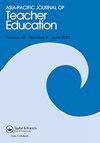Thinking about cross-border experience in teacher education during the global pandemic
IF 1.6
3区 教育学
Q2 EDUCATION & EDUCATIONAL RESEARCH
引用次数: 2
Abstract
If we were to identify one positive outcome of the COVID-19 pandemic, it is the global consciousness that has emerged as a result: The world today is truly interconnected. While global interconnectedness has long been recognised for some time, the incredible speed at which the pandemic has engulfed the globe over the last 12 months has brought home the meaning of this hackneyed concept. The pandemic has given us a very tangible experience of relating to, understanding, or imagining the anxieties and sufferings of those who are located in different parts of the world. Communities now understand the need to help prevent the transmission in a given locality by wearing a facemask or washing hands, for instance. It is now imagined as part of caring for others beyond local and national communities. This emerging sense of global interconnectedness has been hampered, however, by the concurrent rise of populist nationalism, including Trumpism in the US, and the so-called “vaccine nationalism,” where the richest countries monopolise access to COVID-19 vaccines while leaving poor countries of the Global South at greater risk. COVID-19 has exposed both the promises and challenges of developing global consciousness, with many implications for teacher education. None of these concerns are new to those who work in teacher education, however. Indeed, teacher education programmes in many countries have been proactive in introducing global citizenship or global consciousness as one of the important values to be nurtured among pre-service teachers and to be taught in schools. Though these terms remain highly contested, there has emerged a policy consensus that teachers must be prepared to teach in a highly globalised reality of education and society today, where an increasing number of children come from diverse linguistic and cultural backgrounds, where more and more teachers are seeking employment internationally, and where many of the challenges today require local, national and global perspectives and solutions, including refugee and ecological crises and, of course, the global pandemic. It is out of this context, where teachers are positioned as part of the “solutions” to these complex challenges, that various cross-border learning, including international professional experience and service learning, are introduced as part of the core component of initial teacher education programmes today. Indeed, APJTE has recently received a large number of manuscripts focusing on such cross-border experience for pre-service and in-service teachers. Included in this issue are six such studies, undertaken in vastly different contexts and involving different nationalities, including Australia, China, Hong Kong, Japan, the Philippines and the USA. What has transpired from these studies is that “simply bringing the two parties together does not necessarily result in meaningful interactions” (Amos, 2021). Cross-border experience, either overseas professional practicum or service learning within a disadvantaged community, presumes the existence of “differences,” either cultural, socio-economic or ASIA-PACIFIC JOURNAL OF TEACHER EDUCATION 2021, VOL. 49, NO. 2, 143–147 https://doi.org/10.1080/1359866X.2021.1892325对全球大流行期间教师教育跨境经验的思考
如果我们要确定2019冠状病毒病大流行的一个积极成果,那就是由此产生的全球意识:当今世界是真正相互联系的。虽然一段时间以来,人们早就认识到全球相互联系,但过去12个月来,这一流行病席卷全球的速度令人难以置信,这让人们明白了这一陈腐概念的含义。这场大流行病使我们有了切身体会、理解或想象世界各地人们的焦虑和痛苦的经历。社区现在认识到有必要通过戴口罩或洗手等方式帮助预防特定地区的传播。现在,它被认为是照顾地方和国家社区以外的其他人的一部分。然而,民粹主义民族主义(包括美国的特朗普主义)和所谓的“疫苗民族主义”同时兴起,阻碍了这种新兴的全球相互联系感。在“疫苗民族主义”中,最富裕的国家垄断了COVID-19疫苗的获取,而使全球南方的贫穷国家面临更大的风险。2019冠状病毒病暴露了培养全球意识的希望和挑战,对教师教育产生了许多影响。然而,这些担忧对从事教师教育工作的人来说并不新鲜。的确,许多国家的教师教育方案积极地介绍全球公民意识或全球意识,作为职前教师应培养并在学校中教授的重要价值观之一。尽管这些术语仍然存在高度争议,但已经形成了一种政策共识,即教师必须准备在当今高度全球化的教育和社会现实中教书,越来越多的儿童来自不同的语言和文化背景,越来越多的教师在国际上寻求就业,今天的许多挑战需要地方,国家和全球的视角和解决方案,包括难民和生态危机。当然是全球大流行。正是在这种背景下,教师被定位为这些复杂挑战的“解决方案”的一部分,各种跨界学习,包括国际专业经验和服务学习,作为今天初级教师教育计划的核心组成部分被引入。事实上,APJTE最近收到了大量关于职前和在职教师跨境经验的稿件。本期包括六项这样的研究,它们在截然不同的背景下进行,涉及不同的国籍,包括澳大利亚、中国、香港、日本、菲律宾和美国。从这些研究中得出的结论是,“简单地将双方聚集在一起并不一定会产生有意义的互动”(Amos, 2021)。跨境经验,无论是海外专业实习还是弱势社区的服务学习,都假定存在“差异”,文化,社会经济或亚太教师教育杂志,2021,VOL. 49, NO. 1。2,143 - 147 https://doi.org/10.1080/1359866X.2021.1892325
本文章由计算机程序翻译,如有差异,请以英文原文为准。
求助全文
约1分钟内获得全文
求助全文
来源期刊

Asia-Pacific Journal of Teacher Education
EDUCATION & EDUCATIONAL RESEARCH-
CiteScore
4.40
自引率
7.70%
发文量
29
期刊介绍:
This journal promotes rigorous research that makes a significant contribution to advancing knowledge in teacher education across early childhood, primary, secondary, vocational education and training, and higher education. The journal editors invite for peer review theoretically informed papers - including, but not limited to, empirically grounded research - which focus on significant issues relevant to an international audience in regards to: Teacher education (including initial teacher education and ongoing professional education) of teachers internationally; The cultural, economic, political, social and/or technological dimensions and contexts of teacher education; Change, stability, reform and resistance in (and relating to) teacher education; Improving the quality and impact of research in teacher education.
 求助内容:
求助内容: 应助结果提醒方式:
应助结果提醒方式:


